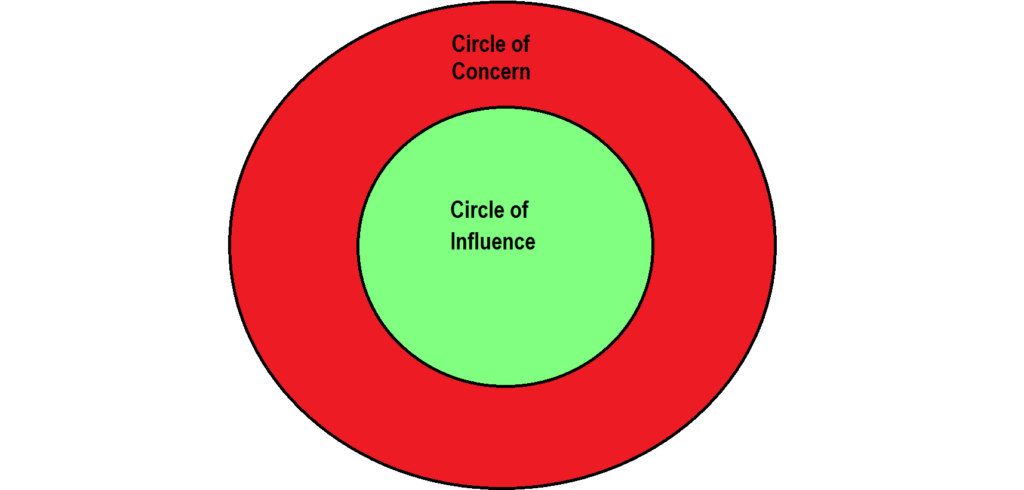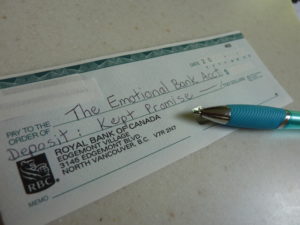The Circle of Concern and the Circle of Influence
In Stephen Covey’s excellent book, The 7 Habits of Highly Effective Families, he discusses the important concepts of the Circle of Concern and the Circle of Influence. We are often hyper-focused on reacting to the Circle of Concern and forget about the very important pro-active Circle of Influence. However, when we focus our attention and energy on the Circle of Concern, this circle gets bigger, and the Circle of Influence gets smaller. The good news is that we when we focus proactively on the Circle of Influence, the Circle of Concern gets smaller.
How Do I Know If I’m in The Circle of Influence or the Circle of Concern?
If you listen to yourself and hear yourself being reactive, and accusatory then you are in the Circle of Concern. For example, “Why did I have to grow up in a drug-addicted family?” “Why did my brother have to make our life so miserable?” “Our kids are so badly behaved, they’re driving me crazy!”
If you’re in the Circle of Influence, your language will be more proactive and will involve taking responsibility. For example, “I can be more consistent about holding regular Family Meetings so we can all discuss how our family is getting along.” “I can learn more about drug-addictions and become more compassionate and understanding.” “I can choose to treat my family members lovingly and with respect.” “I can spend more time connecting with my child.”
Click Circles-4 copy to download the pdf of this Circle image as a reminder for your fridge door, staff room, or purse.
Enlarging The Circle of Influence through Increasing the Number of Deposits into the Emotional Bank Account
The Emotional Bank Account is a metaphor for one’s relationship with another. By proactively doing things that build trust in a relationship, one makes “deposits”. Conversely, by reactively doing things that decrease trust, one makes “withdrawals”. The current “balance” in the emotional bank account, will determine how well two people can communicate and problem-solve together.
You can choose to make deposits instead of withdrawals. No matter what the situation, there are always things you can do that will make relationships better. (p. 46) Stephen Covey, The Seven Habits of Highly Effective Families
Ask yourself, are those around you made happier or better by your presence in the home (or work place)? (p.48)
By focusing on your own Circle of Influence and on making deposits into the Emotional Bank Accounts of those around you, you build relationships of trust and unconditional love. The larger the emotional bank account, the greater the ability to influence others in positive ways.
5 Ways to Make Emotional Bank Accounts Grow and Grow
- Be Kind – sounds simple, yes, but it takes commitment to show kindness consistently and frequently. For example, make a hot chocolate or cup of tea for someone, get a blanket for someone who looks cold, offer to help out when a family member is over-whelmed, give hugs, listen attentively without screen-distractions, express gratitude and appreciation, write a love or thank you note, buy flowers, call from the store to see if anyone needs anything, give compliments, etc.
- Apologize/Re-pair (I’ve written a previous article on the importance of re-pair)- everyone says things they wish they hadn’t or raises their voice more than they would have liked to. To remain open in relationships involves apologizing or others will remain protected around you, less spontaneous and less trustworthy.
- Be Loyal to Family Members Who Are Not Present – try to focus conversation on the positive vs. the negative. Be responsible for your language and be conscious of only saying to others what you would say in front of that person “Always talk about others as if they were present” (p.55)
- Make and Keep Promises – children always remember when you said you would do something with them!
- Forgive – “You will always be a victim until you forgive” (p. 58) To forgive, allows the channels of trust and unconditional love to flow again.
Be proactive is Stephen Covey’s #1 Habit. We have the power to make a choice as to how we will act. As hard as it may be, we have the choice to be pro-active or reactive.
I love the idea of the emotional bank account. It is a metaphor for the “Secure Base” from Attachment Theory and it is the C for Connection in Adlerian Theory. The strength of our relationships will determine our influence.
Have a wonderful week increasing your Circle of Influence and Making Emotional Bank Account Deposits,
Warmly,
Want to Connect?
Subscribe now to receive free weekly parenting tips and inspiration.










One thought on “How To Fill Your Child and Your Spouse’s Emotional Bank Account”
Comments are closed.